These fluid walls called home
reflections on visibility, identity, starting over and finding home as a trans person
I hadn’t been trying to shut my emotions in our Brooklyn closet.
But there they were, waiting to tumble out the door as soon as I buckled myself into the driver’s seat of our car and began driving back to Albany. It was my first time driving since moving to the city. It was also my first trip back … home-no-longer-home.
I navigated the highway arteries leading out of the city, grateful that humans in general are impervious to the emotional meltdowns that happen in the cars alongside them. In fact, the anonymity that a car’s sanctuary offers is something I didn’t realize I’d miss so much, even if I don’t miss driving. Without a space of my own, I haven’t known where to put the emotions that have needed release.
So, into the closet they’ve gone.
. . . . .
A few hours later, the same thing happened as soon as I stepped inside my old home.
The landscape of Five Rivers opened to me, both quiet and vibrating with bird song, ushering me inside. Here, all I couldn’t yet access within the car’s metallic walls came bubbling forth — a cocktail of grief, homesickness, relief and gratitude.
How I’ve missed you, I whispered, allowing myself — finally — to unravel.
I ached to see everyone, torn between rushing and slow savoring. Every dragonfly, heron, milkweed, bird vetch. Every cottontail, deer, frog and crayfish. I didn’t want to miss a sighting.
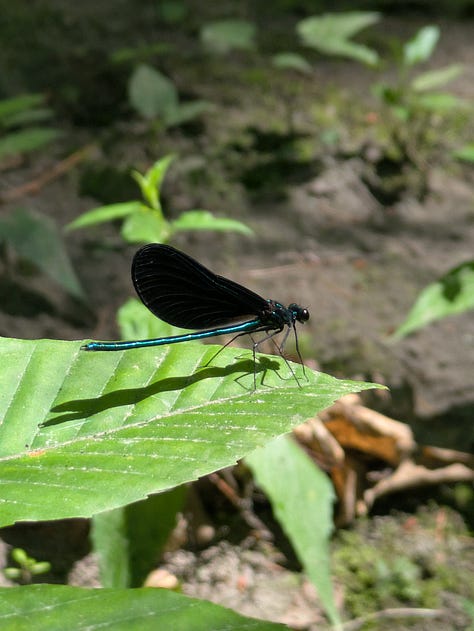

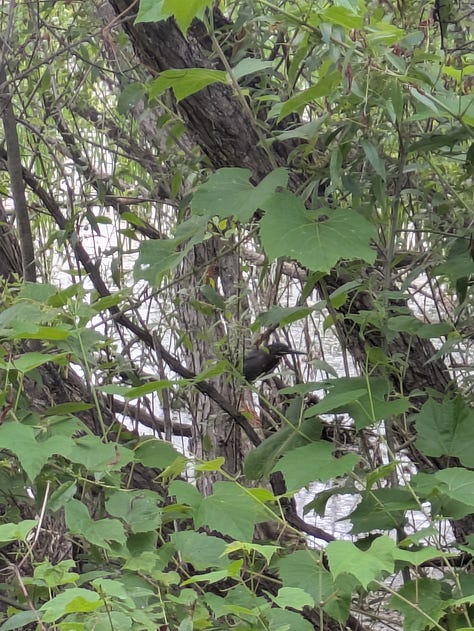

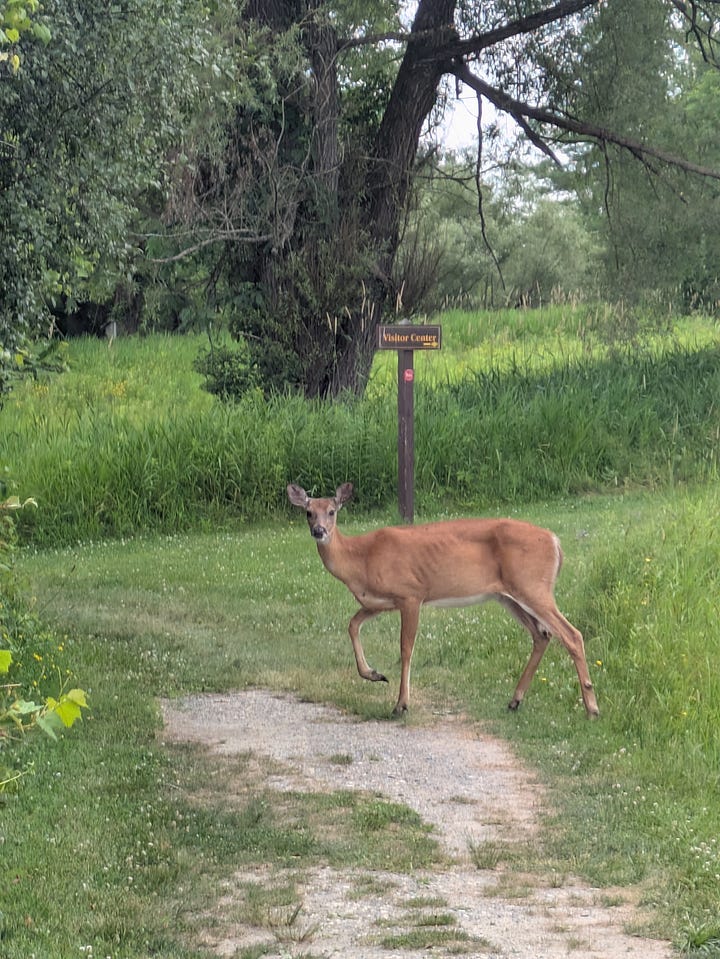
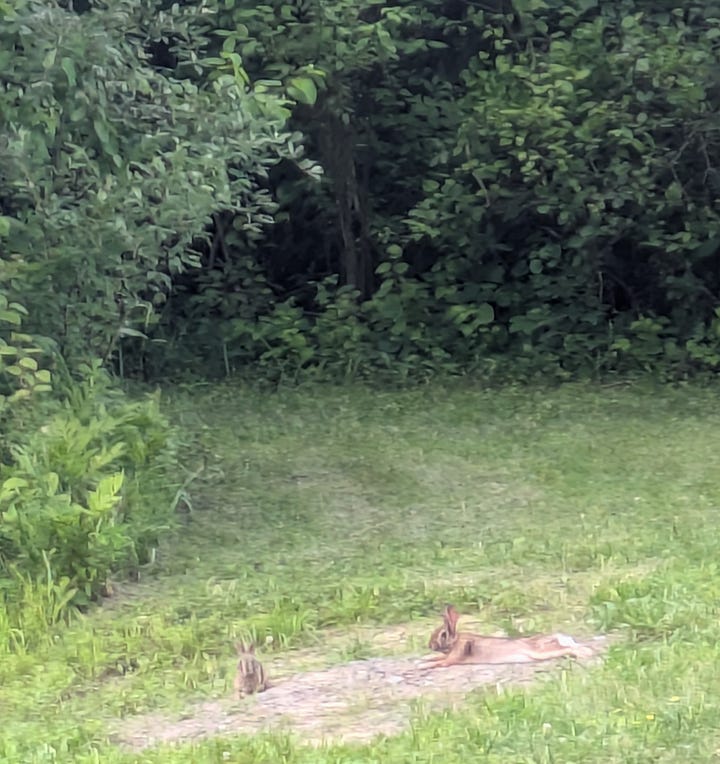
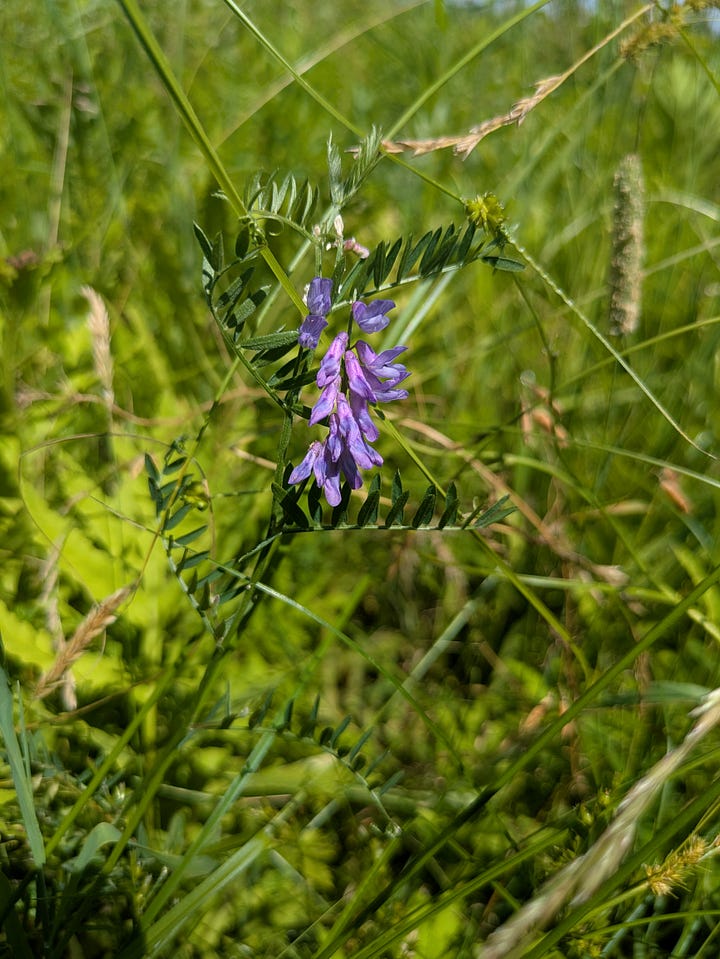
I sat with my toes, transparent in the river water for an hour, watching shy crayfish peek out from their rock caves, the bolder ones scuttling along, camouflaged with their environment. I froze in place at the sight of a green heron at the edge of a pond, pulling my phone out with painstaking slowness to record them. I followed the call of a wood thrush through the forest until spotting them on a pine branch, white and black speckled chest puffed with song. I spied a mama cottontail with her two babies, spread in a belly-to-dirt sploot in the hot afternoon sun. I witnessed the beaver family swimming in the pond, the sounds of their new baby nibbling close by in the reeds.
I paid the mosquitos with my blood, a small price for the nourishment I received.
As I wandered a forest trail, remembering the last time I’d been through — early spring with my beloved, marveling at the pine saplings and mushrooms growing in abundance on fallen giants, roots in the air like old ruins; the delicate sacs of frog eggs in vernal ponds; the nakedness of winter not yet covered — my body ached with the memories.
And more, all that would no longer be.
. . . . .
When you’ve started over enough times in new places, the ache of what’s left behind becomes so familiar it feels like a phantom limb. A ghostly reminder of what was and will never be the same again. The grief of thousands of unknowable what-might-have-beens. Homes enshrined in memory as short stories instead of novels.
Since the age of five, I’ve moved every few years, with the large exception of fifteen years in Seattle. When people asked me, in young adulthood, if I liked moving so much, I answered that it had been good for me to learn how to start over so many times. It made me resilient.
The translation of this, which I didn’t understand until years later: it helped me to avoid forming attachments. Attachments were dangerous in such a mobile existence. Deep roots, far more painful to dig up and replant than shallow ones.
It took me years of staying put in Seattle to understand that the pain of uprooting was worth the investment of loving a place. It took four years in Bellingham, building again from ground zero, to reveal my heart’s capacity to love other places, other homes, as deeply as the ones before without being the exact same love. Flexing the muscles required to risk attachment, spreading roots, digging them up, leaving again.
I didn’t just reside in Bellingham; I belonged to the land that became my family — as much as a settler can belong to stolen land.
It took me moving from the Pacific Northwest, what I had believed would be my forever home, to learn that home is a place I carry inside myself. That every place and person and being I’ve loved lives on in this mobile, internal home.
But Albany was the first place I’ve ever called home where I had felt whole. Not whole as in perfectly “healed,” but whole as in free to live as my authentic self, without hiding, without guarding, without measure.
Through hindsight, it’s clearer to see how deeply interwoven my avoidance of attachments were with my conditioning to hide the parts of myself that weren’t deemed acceptable or lovable. This way of being was the water to my fish bowl; the only thing I’d known since I was old enough to learn people pleasing as a survival skill.
But guess what? It’s nearly impossible to make friends, to find chosen family, to live in wholeness, when you have to pick and choose which parts of you are safe to be seen.
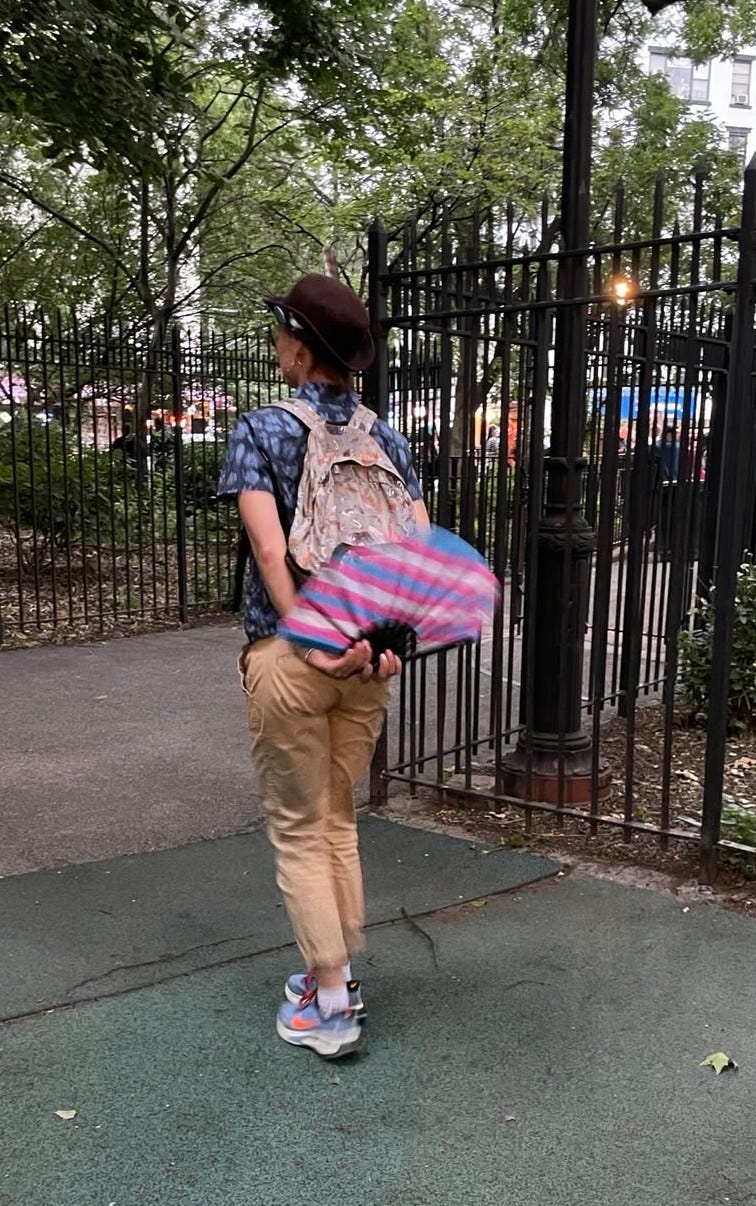
It’s no coincidence that, because Albany was my first home as an out-queer, nonbinary trans person (who felt safe enough to live in as much visibility as I could*), it also became my first experience of gathering to myself a genuine friend group and community. Within six months, in fact, I had begun forming real friendships — something that had never before been my experience. I was so dumbfounded, it felt like a magical fluke.
But a fluke it was not.
My journey to excavate and embrace my trans identity mirrored my journey of openheartedly placing seeds in the soil and nurturing the growth of roots in community with others. My journey of letting people see me. If I could be seen in fullness by myself, I could begin to allow myself to be seen in fullness by people of my choosing.
And like the homes that preceded it, it didn’t take long for me to find my family in the landscape, the natural world. My other-than-human kin.
For me to find my way to Five Rivers.
. . . . .
Walking slowly through the forest that was a short-story home for the first time since leaving, I cried that same cocktail of tears as when I first stepped inside the invisible doorway of Five Rivers.
I felt the grief of an ending.
I felt the gratitude of how I’d been welcomed and embraced by this home, time and again.
I felt the relief of being near enough to return home for visits.
I felt the delicate hope of new roots, slowly growing, in a new place; a quiet confidence in my heart’s capacity to expand.
Brooklyn will never be Seattle or Bellingham, Vermont or Albany. Prospect Park will never replace Five Rivers, just as new friends that grow here will never replace the ones I left behind (or am still connected to by our thread of love and intentional care). I can’t know how long this story of home will be once it’s written; I can only live it with an unguarded heart while I’m here.
But I know I can trust myself to spread my roots into the soil, to thrive where I’m planted, to survive another uprooting. I know that the capacity to grieve what and whom I’ve left behind is not a weakness, not something to armor myself against, but the other face of love.
And I know, as the person I’ve become today, that there’s nothing static about home. Like me, home is alive, fluid, ever-evolving and expanding. And knowing this, somehow, allows more space for me to breathe a deeper love into my chest and out into the world around me.
*Visibility as a trans person is a sticky, nuanced thing. Someone can be allowing themselves to be visible and still be treated as invisible by society and/or individuals. As a nonbinary trans person, my visibility has often been met with silence, misgendering and erasure. But that doesn’t mean I am not visible to myself.




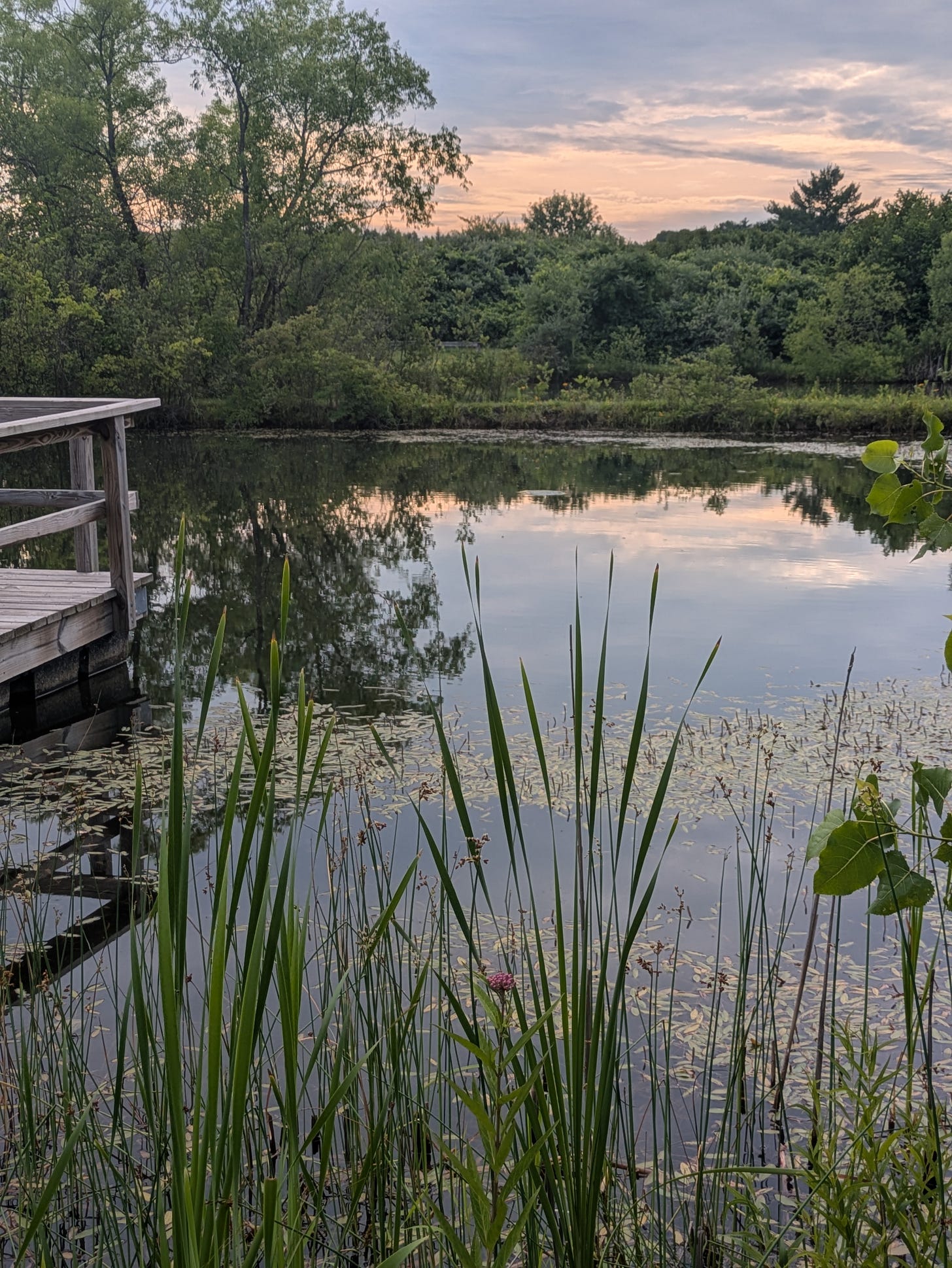
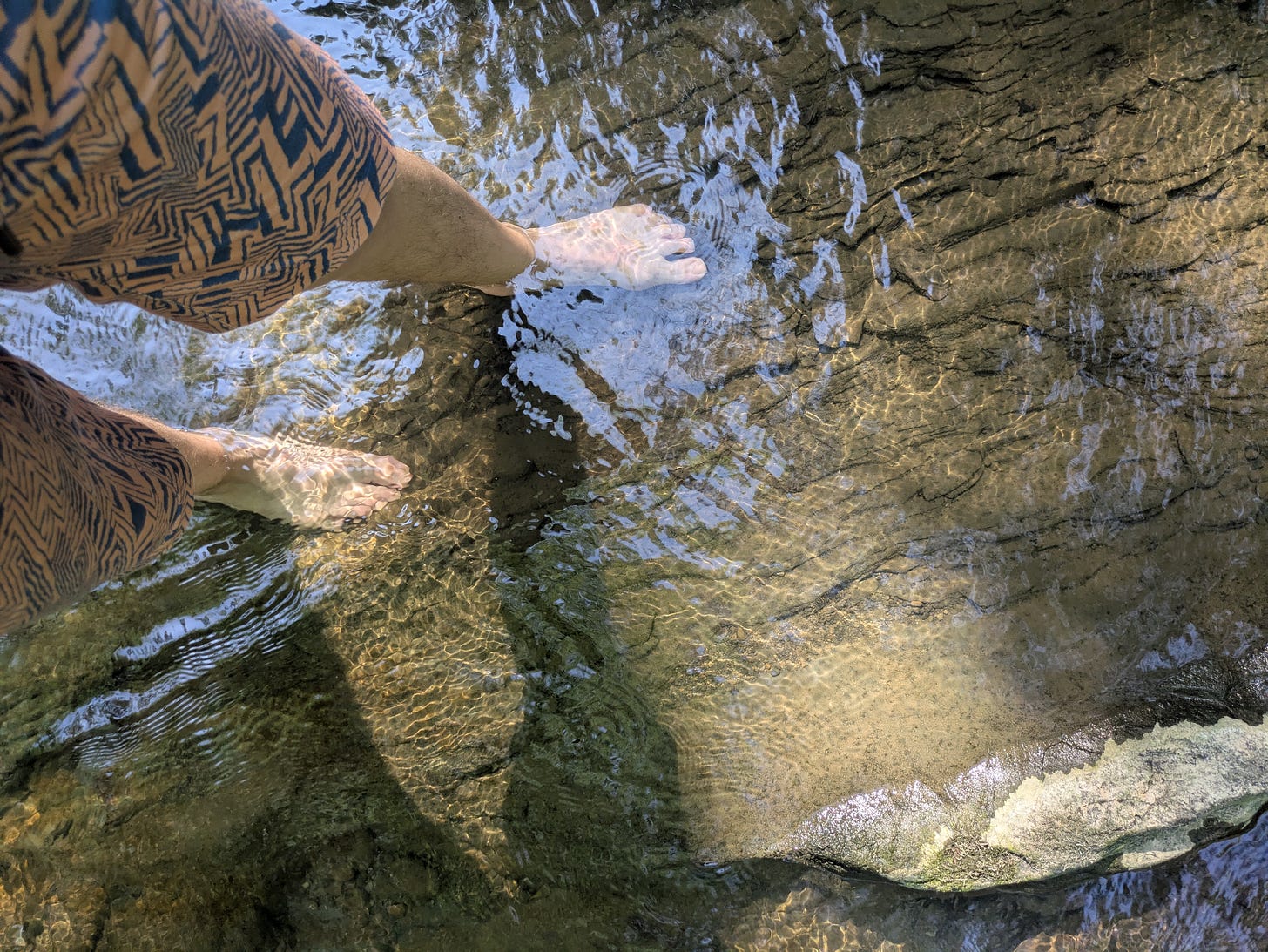
This is all so relatable and resonant, friend...and beautifully crafted. The landscapes you've loved in your various homes, I believe, will never forget you and never stop loving you back. Finding a sense of wholeness like you've described here is no small feat in a trans body (at least not for me in this trans body). It strikes me as maybe the most important home of them all, because without feeling at home in one's self, a true sense of home elsewhere might be elusive or at least ephemeral. Thank you for these resonant and...yep, resilient words. Wishing you ever deeper roots inside yourself. 🌳🌿💚🌈🕊️✨
I love your line about homes as short stories instead of novels. That's been my experience in adulthood, and I resonate with what you shared about learning that it's worth the pain of grief to grow deep roots, even in places that may be temporary. I find it comforting to think about how I'm a walking conglomeration of all the different people who I've loved and been loved by, even if those people are no longer in my life.